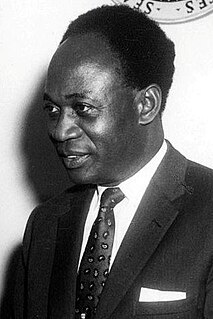
Kwame Nkrumah was a Ghanaian politician, political theorist, and revolutionary. He was the first Prime Minister and President of Ghana, having led the Gold Coast to independence from Britain in 1957. An influential advocate of Pan-Africanism, Nkrumah was a founding member of the Organization of African Unity and winner of the Lenin Peace Prize from the Soviet Union in 1962.

Ahmed Sékou Touré was a Guinean political leader and African statesman who became the first president of Guinea, serving from 1958 until his death in 1984. Touré was among the primary Guinean nationalists involved in gaining independence of the country from France.

Komla Agbeli Gbedemah was a Ghanaian politician and Minister for Finance in Ghana's Nkrumah government between 1954 and 1961. Known popularly as "Afro Gbede", he was an indigene of Anyako in the Volta Region of Ghana.
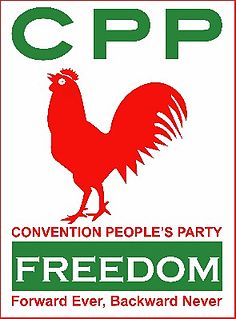
The Convention People's Party (CPP) is a socialist political party in Ghana based on the ideas of the first President of Ghana, Kwame Nkrumah. The CPP was formed in June 1949 after Nkrumah broke away from the United Gold Coast Convention (UGCC). Nkrumah was the then appointed Secretaty General of the UGCC when he was arrested by the leader of the UGCC and imprisoned for an alleged thought, plans and power against Kwame Nkrumah's leadership. Kwame Nkrumah then formed the Convention People's Party with support of some UGCC members and had a purpose for self governance. Upon Kwame Nkrumah's leadership with the CPP, he orgranized a non violent protest and strike for support of the purpose for self-governance which took him to imprisonment for a second time, but he was released after winning a massive vote by the CPP following the colonies election general election whilst he was in prison. The CPP followers supported Nkrumah's ideas and voted for him massive for power of self-governance. The articles discussed about the origins of Ghana political parties, the 1948 riot and the birth of the Convention People Party among others. Issues that led to the formation of the CPP, struggles with the colonial powers led by Kwame Nkrumah and finally the attainment of Ghana's independence were part of the key concerns for this write up.

Louis Lansana Beavogui was a Guinean politician. He was Prime Minister from 1972 to 1984 and was briefly interim President in 1984.
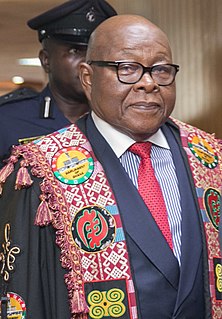
Aaron Mike Oquaye is a Ghanaian barrister and politician who served as the sixth Speaker of Parliament of the Fourth Republic of Ghana from 2017 to 2021. An academic, diplomat and Baptist minister, he previously held the cabinet ministerial portfolios for energy and communication and was also the Ghanaian High Commissioner to India and Maldives in the Kufuor administration.

Joseph Kwame Kyeretwie Boakye Danquah was a Ghanaian politician, scholar, lawyer, and one of the founding fathers of Ghana. He played a significant role in pre- and post-colonial Ghana, which was formerly the Gold Coast, and is credited with giving Ghana its name. During his political career, Danquah was one of the primary opposition leaders to Ghanaian president and independence leader Kwame Nkrumah. Danquah was described as the "doyen of Gold Coast politics" by the Watson Commission of Inquiry into the 1948 Accra riots.

The Union of African States, sometimes called the Ghana–Guinea–Mali Union, was a short-lived and loose regional organization formed in 1958 linking the West African nations of Ghana and Guinea as the Union of Independent African States. Mali joined in 1961. It disbanded in 1963.
Joseph Emmanuel Appiah, MP was a Ghanaian lawyer, politician and statesman.
The United Gold Coast Convention (UGCC) was a political party founded in 1947 whose aim was to bring about Ghanaian independence from their British colonial masters after the Second World War. The United Gold Coast Convention appointed its leaders to include Kwame Nkrumah, who was the Secretary General. However, upon an allegation for plans against Nkrumah's leadership, he was arrested and jailed. The UGCC leadership broke up and Kwame Nkrumah went on a separate way to set up the Convention People's Party (CPP) for the purpose of self-governance.

The Casablanca Group, sometimes known as the 'Casablanca bloc', was a short-lived, informal association of African states with a shared vision of the future of Africa and of Pan-Africanism in the early 1960s. The group was composed of seven states led by radical, left-wing leaders — Algeria, Egypt, Ghana, Guinea, Libya, Mali, and Morocco. The conflict and eventual compromise between the Casablanca Group and the Monrovia Group led to the establishment of the Organisation of African Unity.
Alhaji Imoru Egala was a Ghanaian politician and educationist. He held various positions in government in the Gold Coast and after independence of Ghana. He was the foreign minister of Ghana in the First Republic between 1960 and 1961.
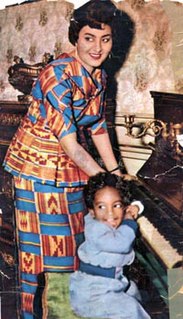
Helena Ritz Fathia Nkrumah, born Fathia Halim Rizk, was a Coptic Egyptian and the First Lady of the newly independent Ghana as the wife of Kwame Nkrumah, its first president.

Samia Yaba Christina Nkrumah is a Ghanaian politician and chairperson of the Convention People's Party (CPP). In the 2008 parliamentary election, she won the Jomoro constituency seat at her first attempt. She is the daughter of Kwame Nkrumah, first President of Ghana.
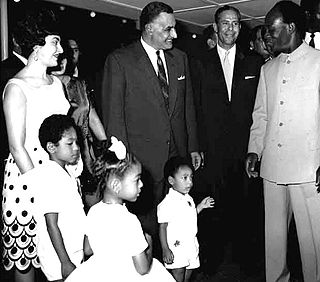
Gamal Gorkeh Nkrumah is a Ghanaian journalist, a Pan-Africanist and an editor of Al Ahram Weekly newspaper. He is the eldest son of the first president of Ghana, Kwame Nkrumah, and his Egyptian wife Fathia Nkrumah.

George Alfred Grant, popularly known as Paa Grant, was a merchant and politician in the Gold Coast who has been called "the father of Gold Coast politics". As a political activist, he was a founder and the first president of the United Gold Coast Convention (UGCC) in August 1947. He was also one of Ghana's Founding Fathers. He paid for Kwame Nkrumah to return to Ghana from the United States.
Founders' Day is a national public holiday observed to commemorate the contributions of all the people, notably the "Big Six" who led the struggle for Ghana's independence. The Founder's Day was formerly called "Founder's Day" with the letter "S" appearing after an apostrophe and it was celebrated to earmark the achievements of Osagyefo Dr. Kwame Nkrumah. Kwame Nkrumah was Ghana's first president and a member of the "Big Six". He was born on 21 September, hence, the "Founder's" Day celebration on 21 September in each year in honour of his participation in the Ghanaian movement for independence from British colonial rule. Other members of the "Big Six" were Edward Akufo-Addo, Joseph Boakye Danquah, Emmanuel Obetsebi-Lamptey, William Ofori Atta, and Ebenezer Ako-Adjei. There were several thoughts and realizations of the leaders of the Present President Akufo Addo's regime that other members of the "Big Six" who were part of the struggles for Ghana's independence must be honour as part of the celebration. The name was changed from "Founder's Day" to "Founders' Day". Meaning that the word is plural to include other member of the "Big Six" as part of Ghana's "Founder's Day" celebration and in honour of them.
The 2012 Ghana Movie Awards was the third edition of the ceremony to reward excellence in the Ghanaian Film Industry. The event was held at Accra International Conference Center on December 2, 2012. The nomination party took place on November 26, 2012.

The Kulungugu bomb attack was a failed assassination attempt on Kwame Nkrumah, the President of Ghana.

The Ghana Union Movement is a political party in Ghana. It was founded by Christian Kwabena Andrews who is also the founder of the Life Assembly Worship Center in Accra. During the launch of the party, he declared that he is "new Kwame Nkrumah" and also that the "spirit of Nkrumah is back." The party's agenda received some backing from Samia Nkrumah, daughter of Kwame Nkrumah.














